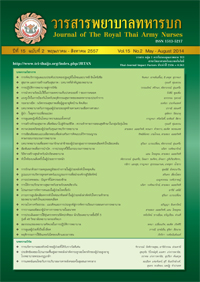ผลของโปรแกรมส่งเสริมการคิดอย่างมีวิจารณญาณต่อความสามารถในการ บ่งชี้แต่แรกเริ่มและการดูแลเด็กโรคไข้เลือดออกเด็งกี ของผู้ดูแลเด็กกลุ่มเสี่ยง
Keywords:
ไข้เลือดออกเด็งกี, การคิดอย่างมีวิจารณญาณ, การบ่งชี้แต่แรกเริ่ม, การดูแลเด็กโรคไข้เลือดออกเด็งกี, ผู้ดูแลเด็กกลุ่มเสี่ยง, Dengue hemorrhagic fever, critical thinking, early detection, care for child dengue hemorrhagic fever, caregivers for child at-riskAbstract
การวิจัยครั้งนี้เป็นการวิจัยกึ่งทดลอง มีวัตถุประสงค์เพื่อศึกษาผลของโปรแกรมส่งเสริมการคิดอย่างมีวิจารณญาณต่อความสามารถในการบ่งชี้แต่แรกเริ่มและการดูแลเด็กโรคไข้เลือดออกเด็งกีของผู้ดูแลเด็กกลุ่มเสี่ยง กลุ่มตัวอย่างคือ ผู้ดูแลเด็กวัยเรียนที่เป็นผู้ดูแลหลักของเด็กอายุ 6 - 12 ปี อาศัยอยู่ในพื้นที่ที่มีอุบัติการณ์และความชุกของการเกิดโรคไข้เลือดออกเด็งกีสูงจำนวน 40 ราย แบ่งเป็นกลุ่มควบคุม 20 ราย และกลุ่มทดลอง 20 ราย โดยกลุ่มควบคุมได้รับการพยาบาลตามปกติ ส่วนกลุ่มทดลองได้รับโปรแกรมส่งเสริมการคิดอย่างมีวิจารณญาณ เครื่องมือวิจัยคือ โปรแกรมส่งเสริมการคิดอย่างมีวิจารณญาณ และแบบประเมินความสามารถในการบ่งชี้แต่แรกเริ่มและการดูแลเด็กโรคไข้เลือดออกเด็งกี ซึ่งผ่านการตรวจสอบความตรงเชิงเนื้อหา และแบบประเมินมีค่าความเที่ยงเท่ากับ .66 วิเคราะห์ข้อมูลด้วยสถิติเชิงบรรยาย และสถิติทดสอบค่าที่ ผลการวิจัยสรุปได้ดังนี้
1. คะแนนเฉลี่ยของความสามารถในการบ่งชี้แต่แรกเริ่มและการดูแลเด็กโรคไข้เลือดออกเด็งกีของผู้ดูแลเด็กกลุ่มเสี่ยงหลังได้รับโปรแกรมส่งเสริมการคิดอย่างมีวิจารณญาณ สูงกว่าก่อนได้รับโปรแกรมฯ อย่างมีนัยสำคัญทางสถิติที่ระดับ .05
2. คะแนนเฉลี่ยของความสามารถในการบ่งชี้แต่แรกเริ่มและการดูแลเด็กโรคไข้เลือดออกเด็งกีของผู้ดูแลเด็กกลุ่มเสี่ยงกลุ่มที่ได้รับโปรแกรมส่งเสริมการคิดอย่างมีวิจารณญาณ สูงกว่ากลุ่มที่ได้รับการพยาบาลตามปกติ อย่างมีนัยสำคัญทางสถิติที่ระดับ .05
This quasi-experimental research was to investigate the effect of promoting critical thinking program on caregivers’ ability to early detection and care for child at-risk of dengue hemorrhagic fever. Subjects consisted of 40 primary caregivers of children age 6 - 12 years old residing in the area of high prevalence and incidence ofdengue hemorrhagic fever. They were equally assigned into either experimental or control group, 20 in each group. The control group received routine nursing care while the experimental group received the promoting critical thinking program. The instruments included the promoting critical thinking program and the evaluation test of ability to earlily detect and care for child at-risk of dengue hemorrhagic fever (ET-AED and CDHF). All of the instruments were tested for content validity. The reliability of ET-AED and CDHF was 0.66. Data were analyzed using descriptive statistics and t-test. The major results are as follows:
1. The mean score of the ET-AED and CDHF of caregivers after receiving the promoting critical thinking program was higher than that of before receiving the program at the signifiant level of .05.
2. The mean score ofthe ET-AED and CDHF ofcaregivers in the group receiving the promoting critical thinking program was higher than that in the group receiving routine nursing care at signifiant level of .05.
Downloads
Downloads
How to Cite
Issue
Section
License
บทความหรือข้อคิดเห็นใดใดที่ปรากฏในวารสารพยาบาลทหารบกเป็นวรรณกรรมของผู้เขียน ซึ่งบรรณาธิการหรือสมาคมพยาบาลทหารบก ไม่จำเป็นต้องเห็นด้วย
บทความที่ได้รับการตีพิมพ์เป็นลิขสิทธิ์ของวารสารพยาบาลทหารบก
The ideas and opinions expressed in the Journal of The Royal Thai Army Nurses are those of the authors and not necessarily those
of the editor or Royal Thai Army Nurses Association.






